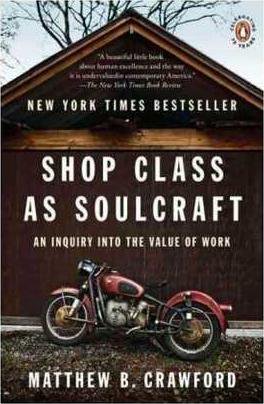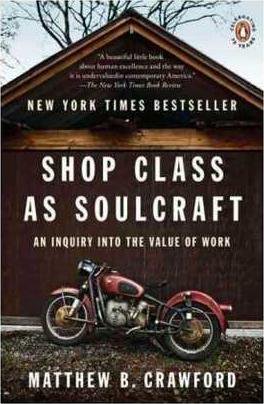‘Shop Class as Soulcraft’
By: Matthew B. Crawford
Price: $15 (paperback)
(Four out of five bookmarks)
This book review came about completely by accident. That is, I never thought I would have picked up the book "Shop Class as Soulcraft" by Matthew B. Crawford, let alone review it. It looked like one of those "guy only" books, a philosophical essay by a mechanic/electrician about the general misconceptions of working in a manual trade, and comparing it to cubicle culture, which nowadays is more widely accepted as the more "legitimate" means of making a living.
But while my husband and I were waiting at the airport for our flight to Cincinnati last weekend, he had already devoured the novel he had packed before we even got on the plane. So we wandered into a little bookshop, and because I knew he likes to make little solar-powered toy cars, I thought this book would at least pique his interest for a few hours flight.
Instead, he spotted me as I took out the novel I had packed to read, a mystery adventure thriller, and he promptly requested to read my book on the flight. That left me with this book that I couldn’t imagine would hold my attention for very long. A book about a repairman’s views on the value of physical work? Yawn.
Surprisingly, "Shop Class"turned out to be an insightful and thought-provoking dissertation, peppered with humorous anecdotes about the various people and experiences that have shaped Crawford’s views on blue-collar versus white-collar jobs. Right from the beginning, my preconceptions about the book were altered just from the flowery language — wasn’t the author of this book a mechanic? But he’s writing like a college professor?
Eventually the author explained that he had graduated with a degree in philosophy, and his previous job had been as an executive director in a "think tank" for a major corporation. Because of the unsatisfactory hum-drum of his job, Crawford quit and set up his own automotive repair shop, returning to his roots as a teenager when he took up work doing electrical and mechanical repairs, which he always enjoyed doing.
Crawford has experienced both sides of the spectrum, and his book presents a thorough case about how manual work provides one with a greater sense of self-reliance and strong labor ethics, as opposed to our current society of consumerism which has led us to ever-increasing dependence on external sources and to become "intellectually disengaged."
In this sense, I could identify with Crawford when he dedicated a chapter to the "stupification" of society, about how those who feel stressed out or inhibited by their office jobs tend to spend their weekends doing a hands-on hobby — some men work on their cars, while women might take up knitting or an artistic craft. Crawford points out that people define who they are not by their jobs, but by what they do in their leisure time, what they have a passion to do rather than what they must do to earn a living.
This was just one passage of "Shop Class" that I found particularly engaging, as it covers a variety of reflections and observations that everyone can identify with, not just "gear heads" (even though a good majority of the book uses motorcycle and car references to illustrate Crawford’s philosophies).
Especially when our economy is in slow recovery and many of us continue to struggle with the job market, "Shop Class as Soulcraft" may make you rethink your line of work and what skills you wish to cultivate. Even though much of our work is now "digitized," we will always have a desire to perform hands-on tasks, for as Crawford quoted from ancient philosopher Anaxagoras: "It is by having hands that Man is the most intelligent of animals."
Alison Reeger Cook is a Gainesville resident whose Off the Shelves book review appears every other week in Sunday Life. Know of a good book to review? E-mail her to tell her about it.

